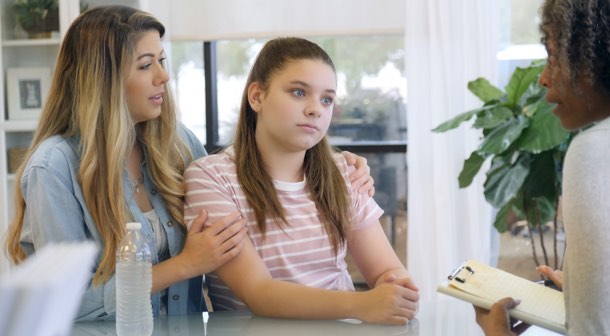Kids & Mental Health: Anxiety, Stress, Depression & More
By GetParentingTips.com staff
Read Time: 9 Minutes
If you're concerned your child may be struggling with a mental health condition, you're not alone. According to the National Alliance on Mental Illness (NAMI), 1 in 6 children age 6–17 experiences a mental health disorder each year.
It's heartbreaking to watch your child struggle with any sort of illness, but the stigma surrounding mental health disorders in children can lead parents to potentially miss early warning signs and delay getting their child the help he (or she) needs.
The Mayo Clinic defines mental illness, or mental health disorder, as "patterns or changes in thinking, feeling, or behaving that cause distress or disrupt a person's ability to function."
Mental health disorders in children can show up as delays or disruptions in normal, age-appropriate development, thinking, and behavior. For example, a child experiencing mental health issues may start to wet the bed, have anxiety about typical situations, have social anxiety, or experience panic attacks about things that didn't bother him before, such as going to sleep or going to school. He might start getting in trouble at school or fail to turn in assignments. These examples are not necessarily signs of mental illness. However, it is important to take note if they are part of a new pattern of behavior. If you notice that your child is not able to function well or that his feelings and behavior are disrupting his life significantly, then it's a good idea to talk to your child's pediatrician about what you're noticing. Having concerns about your child's mental health is nothing to be ashamed of. Many times, fear and embarrassment keep people from getting the help they need. Don't put off talking to your child's doctor if you have concerns. It's important to treat mental health disorders in children early, before negative patterns of behavior take hold and become harder to treat.
Mental health disorders in children are more common that you may realize. According to data from NAMI:
- 50% of all lifetime mental illness begins by age 14, and 75% by age 24.
- 25% of US adults and about 13% of US children are diagnosed with a mental disorder each year.
Need parenting help now?
The Texas Parent Helpline is available 24/7.
- Call 833-680-0611
- Chat with us
- Text 833-680-0611
What causes mental health disorders in children?
Understanding what causes mental illness in children can help take away some of the guilt or fear that may keep parents from taking action. Many parents worry mental health disorders in children are their fault. They feel responsible for the way their child is behaving or acting out. It's important to understand that mental illness can occur for many different reasons.

Factors and circumstances that can contribute to mental illness include:
- Genetics, environment, and lifestyle.
- A stressful home life or traumatic life events, such as a death in the family, divorce, abuse, or illness.
- Brain chemistry and physiology.
The causes of mental illness are too complex to attribute to just one factor in a child's life. Mental health disorders in children can happen because of both genetics and a child's environment or circumstances. It is unlikely that a mental health condition is simply passed down from parent to child.
Know the warning signs.
It's important to be able to distinguish between the normal ups and downs of childhood and signs of mental illness. This can be difficult because growing up is all about change. Your child is always growing and changing, which can cause him to behave differently. Increased hormones during adolescence can have a big impact on a preteen's or teen's emotions and behaviors. This constant change can make it hard to recognize the difference between normal behavior and behavior that may indicate a mental health disorder in children.
Below is a list of warning signs to watch for. These signs don't necessarily mean your child has a mental health condition. Some of these behaviors may be normal responses to stressful situations, such as changing schools or having a new sibling. Everyone can experience anxiety, but when your child's symptoms are constant and seem to be having a negative impact on his daily life, then they could indicate an anxiety disorder. You know your child best so trust your instincts and know the signs.
Some common warning signs of mental health disorders in children include:
- Experiencing feelings of anxiety.
- Having symptoms of a panic attack. A panic attack happens abruptly. There is an intense fear or discomfort that causes the heart to race. Panic attacks can also cause shortness of breath or shaking.
- Returning to behaviors of a younger child, such as bedwetting.
- Persistent or frequent sadness that lasts two or more weeks.
- Losing weight and changes in eating habits; for example, not eating, using laxatives, or throwing up.
- Difficulty sleeping or excessive sleeping (beyond usual teenage exhaustion).

- Avoiding or missing work or school.
- Signs of social anxiety. Social anxiety is an ongoing fear of being watched or judged by others. This could include withdrawing from or avoiding social interactions because of social anxiety.
- Outbursts or extreme irritability.
- Drastic changes in mood, behavior, or personality.
- Destructive, out-of-control behavior.
- Frequent headaches or stomachaches.
- Trouble concentrating.
- Dramatic decline in school performance.
- Fighting with family and friends.
- Drug and alcohol abuse.
- Hopelessness, loss of interest in favorite hobbies or activities.
- Hearing voices.
- Isolation or acting distant.
- Hurting oneself or wanting to hurt others.
- Talking about death or suicide.
If you notice a pattern of behavior that is not normal for your child and he is exhibiting some of these behaviors, talk to your child's pediatrician about your concerns.

All children may exhibit some signs of mental health problems when they are in stressful situations. This does not necessarily mean there is a mental health disorder that requires medical attention. Keep in mind that a child may just need your extra care and support when facing challenging times such as:
- Death of a loved one.
- Divorce or separation of their parents.
- Any major transition such as a new home, new school, or new sibling.
- Traumatic life experiences, like living through a pandemic.
- Bullying or difficulties in school.
If your child is hearing voices, harming himself or others, not eating, abusing drugs or alcohol, or having thoughts of suicide call your health care provider immediately. You can also call the National Suicide Prevention Line at 1-800-273-TALK (8255).
Common mental health disorders in children:
Mood disorders.
Mood disorders involve persistent feelings of sadness or periods of feeling overly happy. Sometimes moods may fluctuate from one extreme to another. Common mood disorders include depression and bipolar disorder.
Anxiety disorders.
Anxiety disorders include panic attacks, phobias, obsessive-compulsive disorder (OCD), and post-traumatic stress disorder (PTSD).
Eating disorders.
Eating disorders involve extreme emotions, attitudes, and behaviors about food, weight, and self-image. Anorexia is when someone doesn't eat enough and becomes very thin. Bulimia is when someone overeats, then purges, such as by forced vomiting. People with bulimia may be of normal weight.
Personality disorders.
People with personality disorders have extreme and inflexible personality traits. They may have trouble perceiving and relating to situations and people. Two common disorders are antisocial personality disorder and borderline personality disorder.
Substance use disorders.
A substance use disorder is the repeated use of alcohol or drugs. Substance use disorders make it difficult for people to meet family, work, or school obligations. Some people with a mental health disorder may also have a substance use disorder.

Psychotic disorders.
Psychotic disorders are when someone loses contact with reality and experiences hallucinations or delusions. For example, schizophrenia is a disorder that can be characterized by hallucinations or delusional thoughts.
Suicidal thoughts and behavior.
Suicidal behavior involves thoughts of wanting to die or trying to kill oneself. People who are suicidal often experience feelings of extreme sadness and hopelessness.
If you would like to know more about mental health disorders, NAMI is a great resource.
Getting help
If you are concerned about your child's mental health, it's important to reach out for help. Here are steps you can take to help your child:
- Talk to your child's pediatrician about the behaviors that concern you.
- Ask your child's teacher, close friends, relatives, or other caregivers if they are noticing anything out of the ordinary. Share this information with your child's doctor.
- If your pediatrician recommends further evaluation, you'll likely need to make an appointment with a specialist such as a psychiatrist, psychologist, clinical social worker, psychiatric nurse, or other mental health care professional.
- If needed, your medical provider will provide a treatment plan, which may include psychotherapy and/or medication.
To make a diagnosis, your child's specialist will evaluate him physically and perform various tests and interviews to understand how your child's condition is affecting his daily life.
The evaluation might include:
- A complete medical exam.
- Medical history.
- History of physical or emotional trauma.
- Family history of physical and mental health.
- A review with parents of symptoms and general concerns.
- Timeline of child's developmental progress.
- Academic history.
- An interview with parents.
- Conversations with and observations of the child.
- Standardized tests/questionnaires for the child and parents.
Diagnosing mental health disorders in children is more difficult than in adults. Young children may lack the language skills to accurately express their feelings, making interviewing them more difficult. It may be a process getting to the right diagnosis. Have patience and keep communicating with your provider until you feel your child is getting the help he needs.

Treatment options
Psychotherapy and medication are typical treatments for children who are diagnosed with a mental disorder. A specialist may recommend treating with both psychotherapy and medication, medication alone, or psychotherapy alone.
Psychotherapy.
In psychotherapy, a child addresses mental health issues by talking with a psychologist or other mental health professional. For young children, psychotherapy may involve playing games that enable the child to talk about and work through his feelings. Psychotherapy teaches children and adolescents how to talk about their thoughts and feelings and how to respond and cope in healthy ways.
Medication.
Some mental health conditions may respond to medication, such as a stimulant, antidepressant, anti-anxiety medication, antipsychotic, or mood stabilizer. Your specialist can explain the benefits and side effects of medication.
Talking to your child about his mental health
Tips for talking about mental health problems with your child:
- Wait for the right time. Pick a time when your child is calm and comfortable.
- Keep it simple. Don't use big words or complicated explanations.
- Be honest about your own experience. Share what you struggled with as a child or teen.
- Let him know that he is not alone. Everyone has anxieties and has to learn strategies to manage them.
- Keep an open mind and be a good listener. Allow your child to speak openly and honestly. Don't judge or criticize, but try to understand his point of view.
- Be aware of your child's feelings and reactions. End the conversation if it's upsetting your child.
Here are a few questions that might help to get the conversation started:
- Can you tell me more about what's going on?
- How you are feeling?
- Have you ever felt like this before?
- How can I help you feel better? I'm here to listen and help you.
- Are you having thoughts about harming yourself or others?

Be your child's mental health advocate.
If your child is diagnosed with a mental health disorder, it's important to learn about the specifics of the condition. The more you know about what your child is experiencing, the better you'll be to support him.
Here are some other ways to support your child:
- Try family counseling.
- Get advice from your child's mental health professional on how to respond to difficult behavior.
- Enroll in programs for parents of children with a mental illness.
- Use stress management techniques to help you respond calmly.
- Find ways to relax, relieve anxiety, and have fun with your child.
- Focus on and acknowledge what your child is doing well.
- Communicate with teachers and other important people in your child's life to make sure your child is supported.
- Find a support group.
Seeing your child struggle with mental health issues can be scary, sad, and overwhelming. Remember that you don't need to handle these challenges alone.
Resources
Seek immediate help if you think your child is in danger of harming himself or others. You can call a crisis line or the National Suicide Prevention Line at 1-800-273-TALK (8255).
Find community mental health services in your area by calling the SAMHSA Treatment Referral Helpline, 1-877-SAMHSA7 (1-877-726-4727). Someone is available to take your call Monday through Friday from 7 a.m. to 7 p.m. CST.


